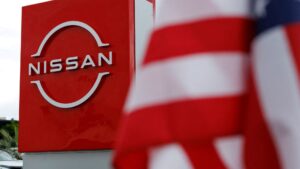Nissan’s Strategic Shift in America: Maximizing Production Amid Tariff Challenges
As the automotive industry navigates a landscape shaped by economic pressures, Nissan Motor’s push for increased domestic production signals a strategic pivot aimed at bolstering its foothold in the U.S. market. Under the leadership of Christian Meunier, who recently took the reins as the chairman of Nissan Americas, the automaker is intent on turning challenges into opportunities.
A Bold Vision for Smyrna
Nissan’s flagship American production facility, located in Smyrna, Tennessee, spans an impressive 6 million square feet with the capability to churn out up to 640,000 vehicles annually. Yet, in 2024, the plant produced only 314,500 vehicles. This discrepancy emphasizes the untapped potential that Meunier is eager to capitalize on. "Our goal is simple: we want to ‘max out’ our capacity and reinvigorate Smyrna to be the powerhouse it once was," Meunier stated in a recent virtual interview with CNBC.
Responding to External Pressures
President Trump’s imposition of a 25% tariff on auto imports has added a layer of urgency to Nissan’s plans. Meunier acknowledges that these tariffs present a unique challenge but also a compelling case for increasing domestic production. "The tariffs have accelerated our plans to localize more of our production," he explained. This strategy aligns with a broader industry trend where foreign automakers are considering reshoring production to mitigate the impacts of tariffs.
Looking Ahead: New Products and Hybrid Options
In addition to focusing on maximizing existing capacity, Nissan is exploring the introduction of new hybrid vehicles and expanding its product line in Smyrna. Meunier has indicated that the plan includes adding models from Nissan’s luxury division, Infiniti, to diversify offerings. This move could position the company competitively in a market increasingly tilted toward electrification and hybrid powertrains.
Nissan’s two assembly plants in Mexico, which produced nearly 670,000 units in 2024, remain crucial to its operations. However, Meunier’s emphasis on local production underscores a potential shift away from reliance on international manufacturing, especially under the looming threat of additional tariffs on auto parts scheduled to take effect in May.
The Power of Domestic Manufacturing
Nissan touts its U.S. manufacturing capabilities, with assembly facilities capable of producing more than 1 million vehicles and 1.4 million engines annually. The Smyrna plant, along with a powertrain plant in Tennessee and another assembly facility in Canton, Mississippi, represents a robust network that Nissan plans to leverage fully. These facilities not only serve the U.S. market but also significantly influence the company’s global supply chain strategy.
Meunier articulates a clear vision: "We can increase production with our existing models while committing to an expanded lineup that will attract new customers. It’s a process, and it can’t happen overnight, but we have the capability and flexibility to adapt quickly."
The Bottom Line
While Nissan faces competitive pressure and market challenges—like positioning the Rogue and Pathfinder against formidable rivals—it remains steadfast in its commitment to innovation and sustainability. Meunier is optimistic about the company’s future, stating, "Despite recent struggles, we have a strong plan in place with excellent products rolling out soon. We’re ready to turn things around."
At Extreme Investor Network, we keep a close eye on how automotive giants like Nissan adapt to changing economic landscapes. With a concerted effort to maximize U.S. production and pivot towards a more sustainable lineup, Nissan proves that even amidst challenges, there are ample opportunities for growth and success. Stay connected with us for more in-depth analysis and updates on the evolving automotive industry.

